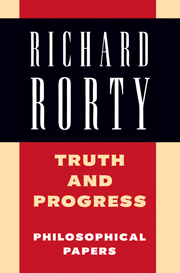Book contents
- Frontmatter
- Contents
- Introduction
- I Truth and Some Philosophers
- 1 Is Truth a Goal of Inquiry? Donald Davidson versus Crispin Wright
- 2 Hilary Putnam and the Relativist Menace
- 3 John Searle on Realism and Relativism
- 4 Charles Taylor on Truth
- 5 Daniel Dennett on Intrinsicality
- 6 Robert Brandom on Social Practices and Representations
- 7 The Very Idea of Human Answerability to the World: John McDowell's Version of Empiricism
- 8 Antiskeptical Weapons: Michael Williams versus Donald Davidson
- II Moral Progress: Toward More Inclusive Communities
- III The Role of Philosophy in Human Progress
- Index
5 - Daniel Dennett on Intrinsicality
Published online by Cambridge University Press: 06 July 2010
- Frontmatter
- Contents
- Introduction
- I Truth and Some Philosophers
- 1 Is Truth a Goal of Inquiry? Donald Davidson versus Crispin Wright
- 2 Hilary Putnam and the Relativist Menace
- 3 John Searle on Realism and Relativism
- 4 Charles Taylor on Truth
- 5 Daniel Dennett on Intrinsicality
- 6 Robert Brandom on Social Practices and Representations
- 7 The Very Idea of Human Answerability to the World: John McDowell's Version of Empiricism
- 8 Antiskeptical Weapons: Michael Williams versus Donald Davidson
- II Moral Progress: Toward More Inclusive Communities
- III The Role of Philosophy in Human Progress
- Index
Summary
The Battle over Intrinsicality
How do we tell when a complete causal explanation of X must include statements about X and when it is enough for it simply to explain why people think there is such a thing as X, explain why “X” is in the language? The Copernicans thought they did not have to explain the sun's motion, because it was enough to explain why the sun was believed to move. Their Aristotelian critics suggested they were confusing the predictive utility of a heliocentric model with the requirements of a genuine causal account. Dennett thinks it enough to explain why there seems to be phenomenology – why it seems as if “there's a difference between thinking… something seems pink to you and something really seeming pink to you.” His critics think this strategy shows that Consciousness Explained merely explains consciousness away.
It seems reasonable for Dennett to reply that explaining something away – explaining why we do not have to make a place for it in our picture, but only for the belief in it- t – is often a good thing to do. The road of inquiry would have been disastrously blocked if we had forbidden this move to the Copernicans or to those other seventeenth-century thinkers who attacked traditional beliefs about witches. On Dennett's account, we believe that there is phenomenology, and we believe in qualia, because we adopted a certain set of metaphors for talking about people, just as Aristotelians believed in solar motion, and witch-hunters in witches, because a certain picture of the cosmos held them captive. The use of these metaphors produced talk about “phenomenological data” – about, for example, what it is like to have something pink on display in the Cartesian Theater.
Information
- Type
- Chapter
- Information
- Truth and ProgressPhilosophical Papers, pp. 98 - 121Publisher: Cambridge University PressPrint publication year: 1998
